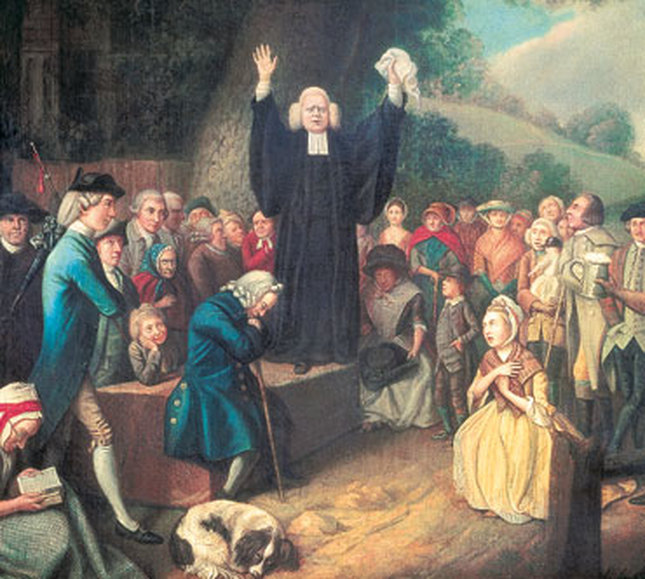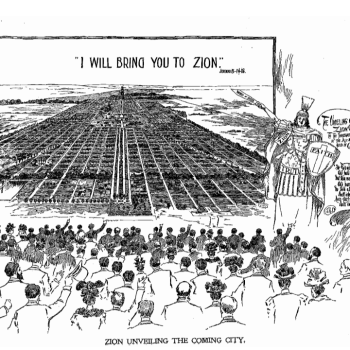Why are evangelical Protestants so often opposed to established institutions, especially in government? And should they be?
I thought about this question this past week, as I led graduate students in a course on the history of American religion through a discussion of Nathan Hatch’s The Democratization of American Christianity. Hatch’s book is now more than three decades old, but its argument has stood the test of time, and it has long been one of my favorite works on nineteenth-century American religious history. In a historical narrative of early nineteenth-century American populist religion that draws comparisons between the Methodists, Baptists, Stone-Campbell Restorationists, and early Mormons, Hatch demonstrates that there was a strong connection between a democratic, anti-clerical, anti-traditionalist evangelical impulse in religion and a corresponding democratic, anti-elitist view of politics. Shortly after the American Revolution, a substantial number of American evangelicals began leading their own religious revolution against church authorities by calling for a restoration of “primitive Christianity” that could be discovered through a common-sense reading of the Bible alone, without any consideration of longstanding creeds. The evangelical populists who were most anti-establishment in their religious views were also highly likely to be anti-establishment in their politics. If they trusted the “common man” to interpret the Bible without the aid of creed or clergy, they were equally likely to trust the “common man” to make the right choice on Election Day, regardless of what the college-educated or monied interests might think.

I have assigned The Democratization of American Christianity several times before and recommended it to others. But this was the first time that I had led a discussion of the book immediately following two back-to-back political party conventions that offered contrasting attitudes toward institutions.
Perhaps somewhat unusually for a party challenging an incumbent president, the Democrats used their convention to position themselves as pro-establishment – that is, a party that believes in scientific expertise, longstanding democratic institutions, and American legal traditions. The Republicans, by contrast, positioned themselves primarily as a party of individual freedom and loyalty to a party leader who has consistently positioned himself as an opponent of bureaucratic institutions. Unless the polls are wildly wrong, an overwhelming majority of white evangelicals will once again vote for the candidate championing this anti-establishment vision, just as they did in 2016.
Trump’s anti-institutionalism is probably not the main reason for his popularity among white evangelicals, but it plays a role – especially because contemporary white evangelicals are deeply suspicious of at least two major institutions in the United States: the “mainstream media” and the federal government. A 2018 survey conducted by the Billy Graham Center at Wheaton College found that approximately half of all American evangelicals “strongly believe that the mainstream media produces fake news.” The study also found that the more active an evangelical is in church, the more likely the person is to distrust the mainstream media. Likewise, a 2014 Pew survey found that 64 percent of evangelicals would like a “smaller government” with “fewer services.” Not all white evangelicals want to replace mainstream media institutions with their own alternative news sources or take an axe to the government bureaucracy, but it appears that a majority of them do.
Where did this evangelical suspicion of the “establishment” and its institutions come from? Perhaps it has something to do with evangelicalism’s inordinate emphasis on the individual. To a greater degree than nearly any other Christian movement of the last two thousand years, American evangelicalism is intensely individualistic, and has been so from its inception.

American evangelicalism had its origins in the First Great Awakening’s emphasis on personal conversion, which was presumed to occur independently of church or sacrament. It gave far less emphasis to the creeds than most Reformed Protestant churches did, and it was even more strongly devoted than the Reformers were to the notion of “sola scriptura” – that is, the Bible as the only authority, this time mediated by no interpreter other than the Holy Spirit-filled individual believer. And the gospel, as preached by evangelicals, focused almost entirely on the offer of individual salvation and warnings against individual sin. Was it any wonder, then, that evangelicals who gave such primacy to individual conversion and the individual right of conscience were individualistic in their approach to politics as well?
This is the story that Hatch’s book tells, but the movement arguably became even more individualistic in the late nineteenth and early twentieth centuries, after Hatch’s narrative ends. At the end of the nineteenth century, a sizeable number of liberal evangelicals, who eventually became known as mainline Protestants and largely abandoned the evangelical label, gave increased emphasis to the social dimension of Christianity, and in the early twentieth century, they created large ecumenical organizations, such as the Federal Council of Churches, to carry out this social mission. And they were deeply committed to the institutions of democratic governance. By contrast, fundamentalists, who represented the conservative wing of the movement, were suspicious of the social gospel and continued to give primacy to individual conversion, which they believed the liberal Protestants had deemphasized. In the 1920s, when the two groups fought with each other for control of denominations and church colleges, fundamentalists lost most of the battles – which meant that the majority of church institutions were now hostile to their point of view. Their influence in governmental institutions and the nation’s newspapers and broadcast media was also limited, compared to the influence of mainline Protestants.
Many fundamentalists who adopted a theology of premillennial dispensationalism perceived this loss of influence in apocalyptic terms. President Franklin Roosevelt’s New Deal was a dangerous harbinger of the antichrist, fundamentalists warned. In the next generation, the children of the depression-era generation of fundamentalists issued similar apocalyptic warnings about American foreign policy institutions and the public educational system.
One might have expected that as a higher percentage of white evangelicals entered the middle and upper-middle class in the 1960s and 1970s by earning college degrees, taking jobs in all sectors of government and the private sector, and earning comfortable incomes, their sense of alienation from American institutions might have diminished. But this did not happen. Evangelicals had a selective attitude toward institutions; many expressed strong support for the military, for instance, but often remained deeply suspicious of academia, even if they themselves had earned graduate degrees. Unlike mainline Protestants, their vision for American democracy was much more populist than institutional. Perhaps this was partly because they sensed that their particular moral values, especially in the areas of gender and sexuality, were out of step with a sizeable number of Americans, and they therefore found it easier to adopt the anti-institutional attitude of a self-perceived persecuted minority than the pro-institutional mindset of mainline Protestants who, for the most part, did not sense the same degree of cultural alienation. But it may have also been rooted in evangelicalism’s longstanding individualistic emphasis on each believer’s personal connection to the Holy Spirit and ability to discern God’s truth directly from the Bible. If Catholicism located the Holy Spirit’s communication in the magisterium and mainline Protestantism grounded it in a more vaguely defined experiential work of God in the church and society, evangelicalism rooted it primarily in the individual believer’s personal interpretation of scripture, which was unmediated by any institution.
When evangelicals entered politics, therefore, they were almost always more concerned about advancing a moral cause than preserving political institutions. This approach led to litmus-test voting among Christian Right activists, where what mattered was not the long-term effect that a particular presidential administration might have on the American nation and its political institutions but rather, where the particular presidential candidate stood on the narrow set of moral issues that concerned the Christian Right. The Supreme Court became only a means to an end; what mattered was not the preservation of the institution itself but instead, only the effect that Court rulings might have on abortion policy or religious freedom.
Anti-institutionalism and an anti-establishment political orientation are rooted in white evangelicalism’s nearly three-hundred-year history of individualism. I do not expect this to change anytime soon. But just because it probably will not change does not mean that it should not.
On one level, of course, a healthy Christian skepticism of human institutions is a good thing, because the Bible is filled with warnings about the ultimate destiny of all political and social institutions that defy the Lord. But the Bible is also filled with admonitions about the foolishness of individuals who act as their own authorities, in defiance of God. Both individuals and institutions are prone to evil – which means that an anti-institutionalism that replaces the sins of established tradition with the sins of an innovative populace acting outside institutional constraints is not likely to be an improvement.
There is a reason that God expected saved individuals to be part of an institution – the church – and endowed that institution with pastoral leadership that was given the power to hold individuals accountable. Even according to an evangelical ecclesiology – an ecclesiology that is admittedly much less institutionally focused than some Catholic theologians might want – the institutional church is still given some degree of authority over the individual. The institutional church can correct straying members in a way that would never happen if each individual Christian was accountable only to their own conscience. We evidently need those constraints. And although this is not true to the same extent of secular institutions, which are not built on the same foundation as Christ’s church, the same principle of correcting the wrongdoer through the apparatus of a bureaucratic institution applies even to a non-Christian government, as Romans 13 suggests.
Institutions can certainly be wrong – and when they are, we should not hesitate to say so. They can be agents of injustice. But institutions can also be reservoirs of tradition that represent a collective wisdom that is far greater than any individual can attain. At their best, institutional bureaucracies can constrain the foolishness of an individual and prevent the chaos that ensues when rules can easily be bypassed. And ultimately, institutions provide a mechanism through which Christians can show love to their neighbors and work for justice.
I would encourage evangelicals who are skeptical of established institutions to continue speaking out against the abuses that institutions inevitably perpetuate. But at the same time, I would also encourage them to adopt the humility needed to see the value of institutional constraints. As a sinner, I need to be constrained by my church, my university, and sometimes by my government. I need bureaucracies; I cannot be a law unto myself. This is something that neither the extreme left nor the extreme right in our nation seems to recognize. But any Christian who believes in the existence of original sin should acknowledge the need for institutional restraints.
So, rather than call for the demolition of institutions, I want to seek reforms to make institutions more accountable, while also preserving the institutional mechanisms that constrain individual recklessness. There is wisdom in maintaining an institutional system of checks and balances. James Madison was not an evangelical Christian, but his view of the need for a system of checks and balances in government (which may have been influenced by a view of human nature that he learned from Princeton’s Reformed evangelical president, John Witherspoon) was probably more consistent with a biblical view of human sinfulness than evangelicals’ unconstrained individualism often is.
Human institutions cannot be equated with the kingdom of God, but until the full consummation of God’s kingdom, we will need human institutions to constrain us. Evangelicals, therefore, should rethink their longstanding anti-institutionalism. It’s wise to be wary of placing too much faith in a human institution, whether in government or anywhere else. But if the only alternative to governmental institutions that we have to offer is radical individualism, we probably need to reread the Bible’s teachings about the individual sinful proclivities that make institutions a necessary part of our fallen world.













